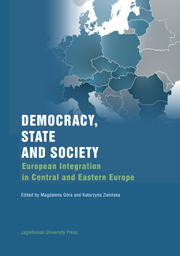Book contents
- Frontmatter
- Contents
- List of contributors
- Europeanisation in the EU New Member States. Aspects and Research Agendas
- Part one Democracy after Enlargement
- The Quality of Democracy
- Dilemmas of Europeanisation: Eastern and Central Europe after the EU Enlargement
- The Eastern Enlargement of the European Union: Challenges to Democracy?
- Political Elite Behaviour in Eastern Central Europe: Provoking Populism and Nationalism?
- From Democracy Fatigue to Populist Backlash
- Part two Identity Transformations
- Part three Civil Society Organisations in Central and Eastern Europe
- Part four Europeanisation of International Relations
- Index
The Quality of Democracy
from Part one - Democracy after Enlargement
Published online by Cambridge University Press: 05 September 2014
- Frontmatter
- Contents
- List of contributors
- Europeanisation in the EU New Member States. Aspects and Research Agendas
- Part one Democracy after Enlargement
- The Quality of Democracy
- Dilemmas of Europeanisation: Eastern and Central Europe after the EU Enlargement
- The Eastern Enlargement of the European Union: Challenges to Democracy?
- Political Elite Behaviour in Eastern Central Europe: Provoking Populism and Nationalism?
- From Democracy Fatigue to Populist Backlash
- Part two Identity Transformations
- Part three Civil Society Organisations in Central and Eastern Europe
- Part four Europeanisation of International Relations
- Index
Summary
The four chapters in this section are all fascinating insights into the democratic transitions in Central and Eastern Europe. They also widen our understanding of how the transitions in Eastern and Central Europe have interacted with any democratic deficit, balance or surplus that is to be found in the wider process of European integration.
Indeed each of the four chapters demonstrates in its different way just how interdependent is the quality of democracy in the national and European arenas (Lord and Harris 2006). Given that the quality of representation any one national public receives at the European level depends in the first instance on the quality of electoral and party systems in its own member state, as well as the qualities of its own national elites, the domestic political system of each member state contributes to the micro-foundations of the European Union's own system of representation. Even allowing for ways in which Union institutions operate according to norms, alignments and constraints of their own, there is still something to the argument that the Union is partly reinvented as a somewhat different polity every time it admits new member states. This is especially so when member states are in some way qualitatively different to the existing membership in the ways in which they organise and practise democracy.
- Type
- Chapter
- Information
- Democracy, State and SocietyEuropean Integration in Central and Eastern Europe, pp. 29 - 36Publisher: Jagiellonian University PressPrint publication year: 2011



